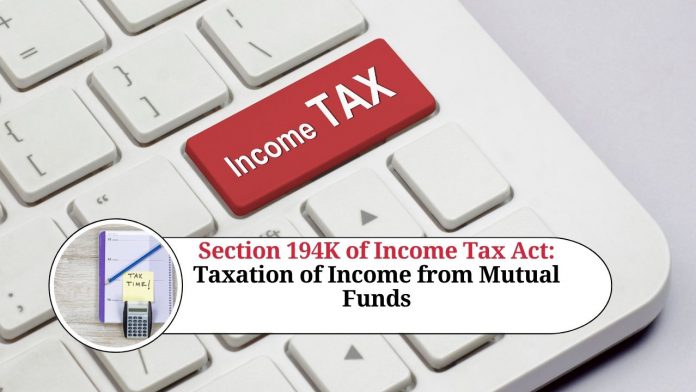Section 194K of the Income Tax Act, 1961 was introduced by the Finance Act, 2021. It is an important provision that deals with the taxation of income arising from units of a mutual fund or a specified company. In this blog, we will discuss the key provisions of Section 194K and its impact on taxpayers.
Applicability of Section 194K
Section 194K applies to income arising from units of a mutual fund or a specified company. A specified company is a company in which the public is not substantially interested and which has been notified by the Central Government for the purposes of this section. This section is applicable to both resident and non-resident taxpayers.
Rate of TDS
The rate of tax deduction at source (TDS) under Section 194K is 10%. This means that if the income arising from units of a mutual fund or a specified company is more than Rs. 5,000 in a financial year, then TDS will be deducted at the rate of 10%. However, if the taxpayer has not provided his/her Permanent Account Number (PAN) to the deductor, then TDS will be deducted at the rate of 20%.
Threshold Limit
As mentioned earlier, TDS under Section 194K is applicable only if the income arising from units of a mutual fund or a specified company is more than Rs. 5,000 in a financial year. Therefore, if the income is less than Rs. 5,000, then no TDS will be deducted.
Exemptions
There are certain exemptions under Section 194K. TDS will not be deducted if the income is paid to:
- A resident individual who is 65 years or older
- A non-resident individual who is 75 years or older
- Any specified entity or fund set up by the Central Government
These exemptions are provided to encourage investment in mutual funds and specified companies.
Impact on Taxpayers
Section 194K has a significant impact on taxpayers, especially those who invest in mutual funds or specified companies. Taxpayers need to be aware of the provisions of this section and ensure that they comply with the requirements. Failure to comply with the provisions of Section 194K can result in penalties and interest.
For example, if a taxpayer has not provided his/her PAN to the deductor, then TDS will be deducted at the rate of 20%. This means that the taxpayer will receive only 80% of the income earned from mutual funds or specified companies. In addition, if the taxpayer does not file his/her tax return and claim the TDS amount, then he/she may lose the opportunity to claim the refund of the TDS amount.
Exemptions under Section 194K are provided to encourage investment in mutual funds and specified companies. These exemptions are provided to senior citizens and specified entities or funds set up by the Central Government. Senior citizens are exempted from TDS to encourage them to invest their savings in mutual funds and specified companies. This helps to mobilize the savings of senior citizens for the benefit of the economy.
Specified entities or funds set up by the Central Government are exempted from TDS to promote the development of certain sectors of the economy. This helps to attract investments in specific areas that are important for the growth of the economy.
Conclusion
Section 194K is an important provision of the Income Tax Act, 1961 that deals with the taxation of income arising from units of a mutual fund or a specified company. The provision has been introduced to ensure that the government receives its due share of tax revenue from such income. It is important for taxpayers to understand the provisions of Section 194K in order to comply with the law and avoid any penalties for non-compliance.
Read more useful content:
- section 234e of income tax act
- section 286 of income tax act
- section 90a of income tax act
- section 40a(7) of income tax act
- section 226(3) of income tax act
- section 24 of income tax act
Frequently Asked Questions (FAQs)
What is Section 194K of the Income Tax Act, 1961?
Section 194K is a provision of the Income Tax Act, 1961 that deals with the taxation of income arising from units of a mutual fund or a specified company.
What is the rate of TDS under Section 194K?
The rate of TDS under Section 194K is 10%.
Is TDS applicable if the income from mutual funds or specified companies is less than Rs. 5,000 in a financial year?
No, TDS is not applicable if the income from mutual funds or specified companies is less than Rs. 5,000 in a financial year.
Who is responsible for deducting TDS under Section 194K?
The person responsible for deducting TDS under Section 194K is the mutual fund or specified company making the payment.
Are there any exemptions under Section 194K?
Yes, there are exemptions under Section 194K. TDS is not applicable if the income is paid to a resident individual who is 65 years or older, a non-resident individual who is 75 years or older, or any specified entity or fund set up by the Central Government.
What happens if I do not provide my PAN to the deductor?
If you do not provide your PAN to the deductor, TDS will be deducted at the rate of 20%.
How can I claim a refund of the TDS amount?
You can claim a refund of the TDS amount by filing your income tax return.
What is the penalty for non-compliance with the provisions of Section 194K?
The penalty for non-compliance with the provisions of Section 194K can be up to the amount of TDS.
Can I get a waiver from TDS under Section 194K?
No, you cannot get a waiver from TDS under Section 194K. However, you can claim a refund of the TDS amount if you are eligible.
Is Section 194K applicable to both resident and non-resident taxpayers?
Yes, Section 194K is applicable to both resident and non-resident taxpayers.




















